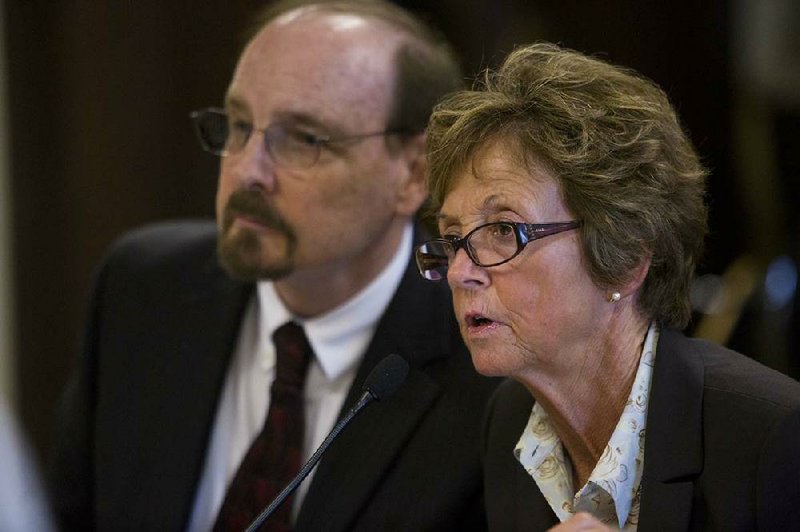The state is updating its minimum licensing requirements for child-care centers in Arkansas for the first time since 1969.
One of the changes, requiring a director to have at least a bachelor's degree, has legislators concerned that it could lead to a shortage of people eligible for the job at the state's more than 2,400 licensed day-care centers.
The proposal also allows individuals convicted of specific nonviolent offenses -- including prostitution -- to work at a child-care facility if they are granted waivers by the state before employment.
The Department of Human Services' Childcare and Early Childhood Education Division presented the proposal Wednesday at the state Capitol to two legislative panels -- the Senate Committee on Children and Youth, and the House Committee on Aging, Children and Youth, Legislative and Military Affairs.
The proposed changes were prompted by a national report from Child Care Aware, an organization in Arlington, Va., that ranked Arkansas 49th in the nation on program standards, said David Griffin, associate director of Arkansas' Childcare and Early Childhood Education Division. The state was praised, though, for its oversight.
The child-care division is holding public hearings across the state about the proposed changes.
A degree in early childhood, child development or a related field is preferred, the proposal states. A bachelor's degree in an unrelated field would be accepted, but the director also would need four years of experience in early childhood education, a current Child Development Associate Credential and a birth-to-pre-kindergarten credential.
Under the current regulations, a bachelor's degree is not required if the director has at least a high-school diploma or a GED along with four years of experience in a licensed child-care or elementary program.
Sen. Eddie Joe Williams, R-Cabot, said the requirement could put a lot of "good day cares out of business." Williams said it would be especially difficult to find child-care center directors with degrees in south Arkansas.
"Sometimes we can be too idealistic," Williams said.
Griffin told the committee that exceptions to the rules can be made.
A clause written into the proposal says those individuals who have been employed as directors or site supervisors before the implementation of this rule will not be required to meet the new director's qualification.
Those individuals who were given the exception could change employers "after this date and still qualify as a director," the proposal reads.
The proposal also would require the director to be on-site a minimum of 50 percent of the center's operational day. Directors who oversee multiple sites or have extended operational hours can name a site supervisor in their absence, but the site supervisor must meet all of the qualifications for a director.
All new directors and site supervisors would be required to attend training within six months of employment and must earn 15 hours in early childhood education. The training must be registered with the child-care division's Education Professional Development Registry or be approved by the Department of Education or Department of Higher Education.
The proposal also would reduce the staff-to-child ratio for child-care providers to one staff member for every five children from birth to 18 months old; one staff member for every eight children 18-months to 36-months old; and one staff member for every 18 children kindergarten age and older.
Providers licensed before the rule change would have two years to comply with the revised ratios.
The proposal also calls for all staff members employed by a facility to undergo a nationwide criminal-background check from the Identification Bureau of the Arkansas State Police within 10 days of hire and every five years.
Currently, all staff members are subject to checks against the Arkansas Child Maltreatment Central Registry and an Arkansas State Police criminal-records check. Only employees who have not been a resident of the state for five preceding years are subjected to the nationwide, fingerprint criminal check.
An exception in the proposal exempts individuals from this requirement if they were employed before the effective date of the proposed changes unless they had a break in employment that exceeded 90 days.
A waiver can be granted for those convicted of specific nonviolent offenses: prostitution, patronizing a prostitute, theft by receiving, financial identity fraud, resisting arrest, forgery, second-degree criminal impersonation, and interference with visitation.
The waiver can be approved if the individual has completed probation or parole supervision, has paid all court-ordered fees, fines and restitution, and the individual has fully complied with all court orders pertaining to the conviction or plea.
The proposed waiver -- which cannot be transferred to another licensed facility -- can be revoked if, after employment, the individual is found guilty of any of those offenses or has been placed on a central registry for child or adult maltreatment.
Committee Chairman Sen. Stephanie Flowers, D-Pine Bluff, expressed concern that there seemed to be exceptions to nearly every rule proposed.
"These rules do not seem to be hard and fast," she said and asked if a facility would be subject to having its license revoked if it was not in compliance.
Griffin said there was a process the facilities would go through that could include revocation of licenses if a satisfactory resolution is not found.
Griffin told the committee that hundreds have attended public hearings held in Bentonville and Texarkana and the feedback has been positive overall.
The proposal will be presented at a public hearing at 10 a.m. today at the Drew County Department of Human Services office, 444 Arkansas 425 North in Monticello. Other hearings are at 10 a.m. Tuesday at the Craighead County Department of Human Services, 1600 Browns Lane Access Road in Jonesboro and at 10 a.m. June 12 at a state government building at 101 E. Capitol Ave., Suite 350, Arkansas River Room, in Little Rock.
A final draft will go back to the legislative committees for review.
A Section on 06/05/2014

